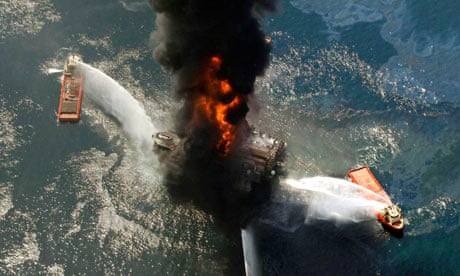The oil spill in the Gulf of Mexico was an avoidable disaster caused in part by a series of cost-cutting decisions made by BP and its partners, the White House oil commission has concluded.
In a preview of its final report, due next week, the national oil spill commission said systemic management failure at BP, Transocean, and Halliburton caused the blow-out in the Gulf of Mexico, and warned that such a disaster would likely recur because of industry complacency.
Many of the poor decisions taken on the Deepwater Horizon drilling rig before the fatal blow-out on 20 April were taken to save time and money.
"Whether purposeful or not, many of the decisions that BP, Halliburton, and Transocean made that increased the risk of the Macondo blowout clearly saved those companies significant time (and money)," the report said.
In a separate chart, it identified nine decisions that increased risk; seven of these saved the companies time. BP was involved in all nine decisions.
BP, which owned the well, did not enforce the proper controls to manage those increased risks, the report said. "BP did not have adequate controls in place to ensure that key decisions in the months leading up to the blow-out were safe or sound from an engineering perspective."
It continued on the same theme, concluding: "Most of the mistakes and oversights at Macondo can be traced back to a single overarching failure – a failure of management."
In earlier pronouncements, the commission's chairmen have suggested a culture of complacency ruled on the Deepwater Horizon oil rig and in the oil industry.
"This disaster likely would not have happened had the companies involved been guided by an unrelenting commitment to safety first," commission co-chairman Bob Graham, said in a statement. "And it likely would not have happened if the responsible governmental regulators had the capacity and will to demand world-class safety standards."
On 11 January, the seven-member commission will publish its full report into the causes of the blow-out, which killed 11 men and spewed 4.9 million barrels of oil into the Gulf. Its findings could prove critical to the civil lawsuit filed last month by the US Justice Department against BP, Transocean and other companies involved in the spill for damages to the environment, as well as the hundreds of lawsuits filed by Gulf residents who have lost their livelihoods because of the spill.
The report warned that BP and the other companies could be liable for billions more in compensation to people who have lost money because of the oil spill, and for damage to natural resources.
The explosion was caused by a sudden kick of gas through the 5,000 ft riser pipe connecting the well to the Deepwater Horizon oil rig that – another investigation found – went undetected for several crucial moments. The report identified a series of mistakes that, it said, eventually made the blow-out "inevitable."
It paid particular attention to the faulty cementing job, performed by Halliburton, at the bottom of the well. But it blamed BP for failing to exercise proper oversight over the cementing job, and for misreading a pressure test that indicated the well had not been properly sealed.
"Based on evidence currently available, there is nothing to suggest that BP's engineering team conducted a formal, disciplined analysis of the combined impact of these risk factors on the prospects for a successful cement job," the report said.
It also criticised BP's choice of a long string well design. BP crew were also wrong to replace heavy drilling mud in the riser pipe with lighter seawater before the well was properly sealed, the report said.
Transocean also came in for criticism for failing to communicate to its crew the risks of deepwater drilling even after a near-miss only months earlier.
BP said in a statement that it was working with government regulators to ensure that the experience in the Gulf led to improved practices.
Transocean tried to shift the blame to BP and government. "The procedures being conducted in the final hours were crafted and directed by BP engineers and approved in advance by federal regulators," a company statement said.
Halliburton, which has previously criticised commission lab tests finding a faulty cement seal, said the commission had made use of selective information.








Comments (…)
Sign in or create your Guardian account to join the discussion